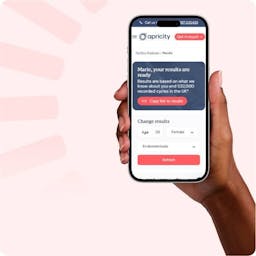Call us today on +44 7897 035438
Does egg freezing hurt?
The egg freezing process is incredibly safe and minimally invasive, so while there may be some elements that might cause a small amount of discomfort, you should not experience any pain.

Table of Contents
Egg freezing is a very safe, well-tolerated process. While you may experience some mild tenderness or discomfort at different stages of your cycle, it is unlikely you will find that any part of egg freezing hurts.
However, we understand why pain may be a worry, especially if you have never been through the egg freezing process before and are at the initial stages of exploring options for preserving your fertility. To put your mind at ease, this guide looks at various aspects of egg freezing including blood tests, ultrasounds, ovarian stimulation medications and egg collection so that you know exactly what to expect.

Do hormone blood tests hurt?
Before commencing an egg freezing cycle, you'll require some initial fertility tests. The results of these help your Apricity consultant to tailor your care and treatment plan. These include a simple finger prick blood test that you can conduct at home, although you can attend a clinic if you prefer.
Once your cycle gets underway, you'll also need regular blood tests to monitor the level of certain hormones. These indicate how your body is responding to your ovarian stimulation medications, whether your consultant needs to adjust dosages and when you are ready for egg collection.
These blood tests are like any other blood test you might have. A trained fertility nurse will insert a needle into a vein in your arm and collect the blood needed for the tests into airtight vials. You are likely to feel a small pinch as the needle pierces your skin and the site might be a little tender afterwards, but most people don't find that blood tests hurt.
Do internal ultrasounds cause pain?
Internal ultrasounds, also known as transvaginal ultrasounds, are a fundamental part of the egg freezing process. This procedure involves inserting a small ultrasound probe into the vagina to look at the ovaries and monitor follicle growth.
While discomfort levels can vary from person to person, many individuals describe the sensation as mildly uncomfortable rather than painful. You will require several ultrasound scans during the egg freezing process, but each procedure typically lasts for just a few minutes. The scans will take place in a private room and your comfort is always the top priority. When undergoing egg freezing with Apricity, you may even have the option to have your ultrasounds conducted in your own home, depending on your geographical location.

Does injecting the hormone medications hurt?
Another key component of the egg freezing procedure is the hormone medications that stimulate your ovaries to produce multiple eggs. These injections often include hormones such as follicle-stimulating hormone (FSH), luteinizing hormone (LH), and sometimes, human chorionic gonadotropin (hCG). These medications are typically self-administered through injections into the skin using very fine needles, which can cause worry for some individuals. However, most people find that the injections cause minimal discomfort, akin to a quick pinch or mild stinging sensation. You may also experience some tenderness, redness or bruising at the injection sites but this is usually temporary.
With Apricity, you’ll get thorough guidance on injection techniques to minimise any discomfort or anxiety you feel about this part of the process. You’ll also have 7/7 access to your own fertility advisor should you have any additional questions or concerns.
Is ovarian stimulation painful?
Ovarian stimulation, the phase during which hormone medications are administered to stimulate egg production, is essential for successful egg freezing.
Some people may experience some side effects from the medications. Bloating and mild abdominal discomfort are common due to the process of increasing the size of your ovaries. Other common side effects include:
Breast tenderness
Fatigue
Hot flashes
Nausea
Headaches
You should not feel any severe pain during ovarian stimulation. If you do have any concerns or unusual symptoms, you can raise these with your Apricity consultant who will offer you personalised guidance and support.
How painful is egg retrieval?
Egg retrieval (or egg collection) is a procedure to collect mature eggs from your ovaries. It's minimally invasive and usually lasts about 20 minutes. It involves a fine, ultrasound-guided needle being passed through the vaginal wall and into the ovaries, where it enters each follicle and draws out the fluid from inside which includes the eggs.
You undergo egg retrieval under conscious sedation or general anaesthesia, which ensures a pain-free experience during the brief surgical procedure. Post-retrieval discomfort, such as cramping or abdominal tenderness, is normally temporary and can be managed with over-the-counter pain relief.
Is there a recovery period after egg collection?
Immediately after your egg collection procedure, you’ll be monitored in-clinic for around an hour to check that you are ok and have no ill effects from the sedation. It's normal to feel a little groggy in the hours after egg collection and to experience mild discomfort, bloating, or spotting for a few days afterwards. However, these symptoms generally subside quickly, and many people resume their daily activities within a day or two.
Is egg freezing hard on your body?
While the egg freezing process involves various medical procedures and hormonal interventions, it is generally well-tolerated physically by the body. Any discomfort you experience throughout the process will likely be minor and temporary.
For some people, the emotional impact of an egg freezing cycle is also a concern. Prioritising self-care and seeking support from loved ones can help you navigate your feelings as you go through the process. Your Apricity team is also there to support you at every stage from initial consultation through to egg collection and beyond. Your Fertility Advisor is available daily through extended hours and our app gives you a wealth of medically certified guidance at your fingertips. What’s more, we offer counselling to all our patients which takes place online, from the comfort of your own home.
What are the risks of egg freezing?
As with any medical procedure, egg freezing carries certain risks and side effects, most of which have already been outlined and are mild and manageable. Some rarer potential risks include:
Ovarian Hyperstimulation Syndrome (OHSS): This is a response to ovarian stimulation syndrome. Mild OHSS is common and usually resolves itself but around 1% of people experience severe OHSS which is more serious.
Ovarian torsion: The increased weight from multiple stimulated follicles can cause an ovary to twist which cuts off its blood supply. Surgery is required to untwist the ovary.
Infection: If bacteria enters the uterus or ovaries during egg collection, this can result in infection and pelvic inflammation.
Puncture of bladder, bowel, or blood vessels: The needle used during egg collection can, in very rare circumstances, puncture another part of the body.
When you choose Apricity for your egg freezing journey, you can be safe in the knowledge that you are in the care of an experienced team that holds your well-being at the highest of importance and wants to make your experience as positive and as hassle-free as possible. To find out more about how to freeze your eggs with Apricity, book a free consultation with a fertility advisor.
References

Written by Apricity Team
Helping you stay informedWritten by our group of fertility experts and doctors consultants
Written by our group of fertility experts and doctors consultants
Keep reading
Why Apricity
Preserve Fertility
Fertility Treatments
Egg Donation
Ⓒ Apricity Fertility UK Limited. All rights reserved


